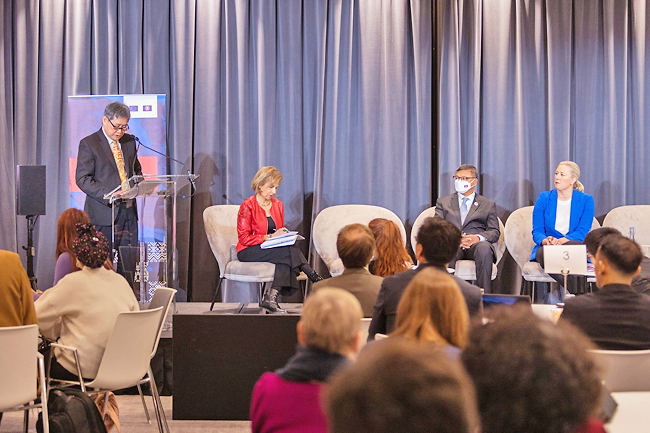Danial Norjidi
Higher education and research cooperation were highlighted as a key pillar to the strategic partnership between the European Union (EU) and Association of Southeast Asian Nations (ASEAN) regions during a recent event titled ‘Celebrating EU-ASEAN People-to-People Cooperation on Higher Education’.
The December 12 event was held ahead of the EU-ASEAN Commemorative Summit on December 14 in Brussels, with this year marking 45 years of dialogue relations between the EU and ASEAN.
The event was organised by the European Commission and the ASEAN Secretariat, in partnership with the EU Support to Higher Education in the ASEAN Region (SHARE) and Erasmus+ programmes. SHARE is an EU-funded project with an overarching objective to strengthen regional cooperation, enhance the quality, competitiveness and internationalisation of ASEAN higher education institutions and students, contributing to an ASEAN Community. Meanwhile, Erasmus+ is the EU’s programme to support education, training, youth and sport in Europe.
According to a press release, the event was attended by high- level stakeholders, and in addition to discussing the numerous gains achieved through higher education and research cooperation, also identified greater mobility of students and professionals as a driver to further knowledge and facilitate the flow of ideas and innovation between the EU and Southeast Asia, all of which enhance employability, digital transition, and the green agenda.

In her remarks, Commissioner of International Partnerships at the European Commission Jutta Urpilainen said, “We are highly interconnected and interdependent regions and economies, both EU and ASEAN.
“We face global crises like climate change, biodiversity loss and rising inflation, and we both actually understand the power of education and research in addressing such challenges.”
Noting the potential of the EU-ASEAN strategic partnership in higher education and research, Urpilainen shared three points.
Firstly, she highlighted that education and learning are globally in crisis because of underfunding. “The pandemic unfortunately made things worse a slow recovery has meant less funding for basic services including education.”
She noted that in September, at the United Nations (UN) Transforming Education Summit, the EU called on the international community to protect education budget.
“We know that basic services are key to resilience and education, research and innovation can drive new growth. So we ask the others to join and invest more, but also better in education.
“We as team Europe provide over half of total official development assistance to education and we increase a lot our share of education funding in partner countries. Starting from seven per cent, we are now up to 13 per cent, which means over EUR6 billion.”
She said that these investments help to transfer education in the EU’s partner countries, including ASEAN member countries.
On her second point, the commissioner said, “We must continue to enhance EU-ASEAN cooperation, also on higher education and research.”
She shared that since 2015, the SHARE programme has supported ASEAN’s vision of a common higher education space, noting that it has awarded nearly 600 scholarships and virtual exchanges between the EU and ASEAN, and within ASEAN itself.
The Erasmus+ programme is another standout example, she said. “It has forged close links worldwide including between students and researchers from the EU and ASEAN. Beyond student mobility and building ties between universities, Erasmus+ strengthens teaching human resources and governance capacities.”
Thirdly, Urpilainen mentioned the EU’s EUR300 billion Global Gateway investment strategy, which she explained “fosters partnership” and “builds on wide cooperation and working with private sector”.
She highlighted that “It will further deepen the EU-ASEAN cooperation on higher education and research.
She revealed that on Wednesday, December 14, the Sustainable Connectivity Global Gateway Flagship will be launched.
This, she said, will “build on the very successful SHARE programme” and “key priorities include strengthening student and academic mobility, reinforcing cross-regional university networks, and boosting ASEAN vocational education institutions and businesses, notably to support the green and digital transitions”. Secretary-General of ASEAN Dato Paduka Lim Jock Hoi thanked the EU for its “continued support in the advancement of ASEAN higher education” mentioning a new report on “the current state of higher education in the region (which) highlights key thematic areas including equity, diversity and inclusion, internationalisation and regionalisation of higher education, and sustainability that needs to be addressed to improve ASEAN higher education”.
In addition, Cambodian Minister of Education, Youth and Sports Dr Hang Chuon Naron highlighted that the EU and ASEAN are transforming education through the partnerships and “must work together to achieve the sustainable development goals (SDGs) and leave behind a better world for all”.
It was shared that key thoughts for the future include “1) university reforms are necessary to develop soft skills and 21st Century skills…; 2) Universities (become) a hub within an entrepreneurial ecosystem – (allowing education to link to the real world…3) University-business sectors (link up) to promote joint projects and research…4) and establish an EU-ASEAN Cyber University to, amongst other things “implement digital education programme such as coding, app, robotics, etc”.







